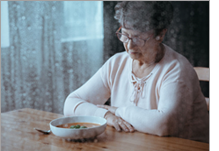Recognizing Depression in Seniors
It’s no surprise that many older adults find themselves lonelier than they were in their youth. The likelihood of living alone, losing a spouse, siblings, and/or close friends only increases each year as older adults grow older. Top that with chronic health conditions, limited mobility, and/or no longer able to drive, and an older adult’s risk of living isolated just increased even more. Even older adults who don’t live alone can experience loneliness and depression. Loneliness is the perception of being alone and feeling disconnected. Feelings of loneliness and social isolation are major risk factors to depression. If left unchecked, depression can lead to an increased risk for cardiac diseases and even death from illness. It’s critical that older adults are evaluated and treated for depression, even if the depression is mild.
depression can lead to an increased risk for cardiac diseases and even death from illness. It’s critical that older adults are evaluated and treated for depression, even if the depression is mild. Unfortunately, many older adults don’t like to talk about their feelings of loneliness or depression. Elderly depression can also be masked in chronic health problems and the medications used to treat those conditions. Here are a few signs to look for if you are concerned that your aging loved one may be depressed.
Start with Their Risk Factors
Start by learning the risk factors for depression in older adults. Risk factors include being female, being single, widowed, unmarried or divorced, not having a support system, and recently experiencing a stressful life event. Certain health conditions also increase an older adult’s risk factor for depression, such as hypertension, diabetes, cancer, dementia, stroke, and chronic pain. Other factors to be mindful of include a family history of depression and the side effects of certain medications.
Sudden Change in Weight
One sign of elderly depression is a sudden, unplanned change in their weight. Depressed older adults may eat more or less than usual, causing a significant weight gain or loss. They may push their food around their plate, but not take a bite of it. They may inhale food all day long to fill the void depression leaves. If you find yourself buying smaller or larger sized clothes for your aging loved one, it may be a sign that they are depressed.
Withdrawal from Activities
Another sign of depression in older adults is a withdrawal from their favorite activities or declining social invitations. Seniors who are depressed are more likely to withdraw from their favorite activities, social or independent. They just don’t have the energy to participate in life. When they do accept an invitation, they may withdraw privately or appear anxious to return home. If your aging loved one frequently declines an invitation to family dinner or hasn’t picked up their favorite hobby in a long time, it might be a sign that they are depressed.
Change in Sleep Patterns
Seniors who are depressed are more likely to experience chronic fatigue and have variable sleep patterns. They may sleep away most of the day, have a hard time waking up in the morning, or suffer from insomnia. Depressed seniors also move and talk more slowly and can be irritable or restless. If you’ve noticed that your aging loved one is sleeping longer or has shared that they’re up all night, and this is not normal for them, then it may be another sign that they are depressed.
Moodiness
Lastly, another sign of depression in seniors is a consistent state of emotional turmoil. Depression doesn’t necessarily mean that a person cries all the time. Depression can also manifest itself in crankiness, irritability, guilt, or anxiety. Older adults are less likely to engage in conversation about their feelings, so it’s important to be on the lookout for changes in their mood. If your aging loved one seems to be in a persistent angry mood, or they sound more pessimistic than usual, they could be struggling with depression.
Depression is not a normal part of aging. It can be treated by medication and/or therapy prescribed by a doctor. It can even be prevented through regular exercise, eating a healthy diet, and consistent participation in activities, both social and independent. Visiting Angels Fort Worth can help older adults who are struggling with feelings of loneliness and depression. One of the many services we offer is Elderly Companion Care. Our companion care services include light housekeeping, shopping, meal preparation, help with running errands, and most importantly, companionship. We all need companionship and from time to time we all need a helping hand. To learn more about our wonderful Elderly Companion Care services, and how we can help your aging loved one ward off depression and loneliness, please contact us today.
